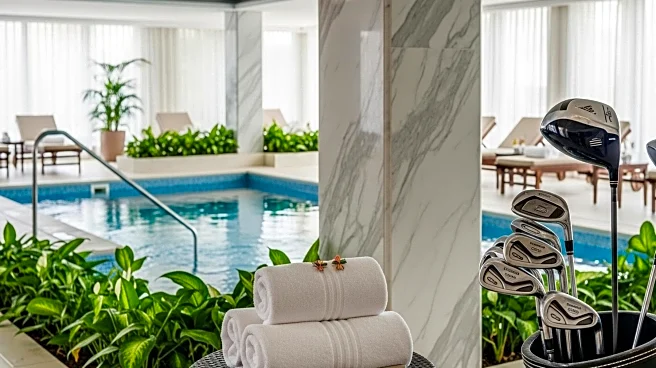What's Happening?
Mandarin Oriental has unveiled plans to open its first golf resort, Mandarin Oriental Jumeirah Golf Estates, in Dubai by 2030. This will be the company's third property in the city, located within the Jumeirah Golf Estates development. The resort will feature 121 rooms and suites, along with 97 branded residences offering three- to six-bedroom villas equipped with private amenities. The Spa at Mandarin Oriental will occupy nearly 5,000 square meters, providing wellness, beauty, and massage treatments, alongside male and female-only pools and an outdoor meditation area. The development is part of the broader Jumeirah Golf Estates project, aiming to integrate golf, equestrian, and wellness amenities.
Why It's Important?
The introduction of Mandarin Oriental's golf resort in Dubai signifies a strategic expansion into the luxury wellness and leisure market. This development is expected to enhance Dubai's reputation as a premier destination for high-end tourism, potentially boosting local businesses and the hospitality industry. The integration of wellness amenities reflects a growing trend in the hospitality sector, where luxury hotels are increasingly incorporating comprehensive wellness programs to attract health-conscious travelers. The project could also stimulate economic growth by attracting international visitors and creating job opportunities in the region.
What's Next?
As the project progresses, stakeholders will likely focus on marketing the resort's unique offerings to attract global tourists. The development may prompt other luxury hotel brands to consider similar expansions in Dubai, further enhancing the city's competitive edge in the global hospitality market. Local businesses and tourism operators might prepare to capitalize on increased visitor traffic, while the hospitality industry could see a rise in demand for skilled professionals to support the resort's operations.
Beyond the Headlines
The resort's emphasis on wellness and leisure amenities highlights a broader shift in consumer preferences towards holistic travel experiences. This trend may encourage other sectors to innovate and integrate wellness-focused services, potentially influencing cultural and lifestyle changes in the region. The project's success could also inspire similar developments in other parts of the world, promoting sustainable tourism practices and enhancing global wellness tourism.









